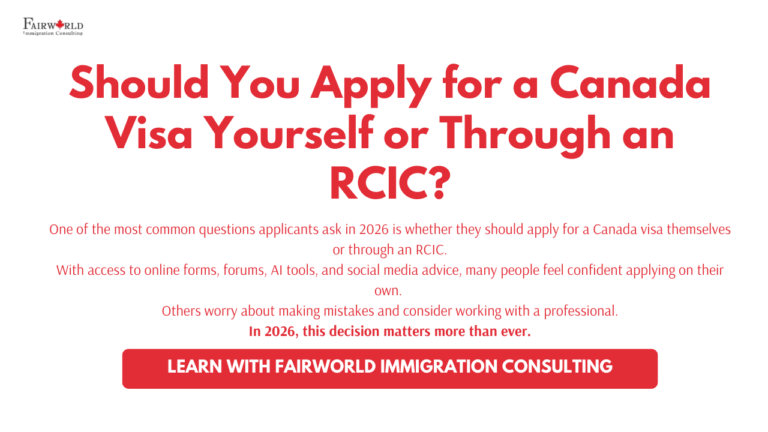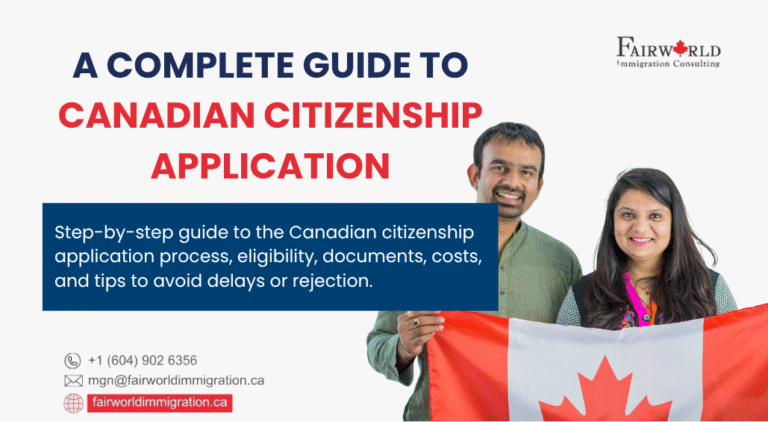A Guide for Newcomers and Professionals On Getting Accredited in Canada
Published on November 25th 2025 by Fairworld Immigration
Moving to Canada is an exciting milestone filled with opportunities. For many immigrants, it’s also a chance to restart or continue their professional journey in a new environment. Understanding how getting accredited in Canada works is an important step toward establishing your career and building long-term stability.

In Canada, career changes and restarts are common. Many newcomers begin in one industry and eventually find success in another. The country’s labour market values skills, dedication, and adaptability, not just titles or degrees.
Why Accreditation Matters for Newcomers
When you arrive in Canada, your qualifications and work experience from abroad may not automatically transfer. This doesn’t mean your experience isn’t valuable, it means you need to meet specific Canadian standards to work in regulated fields.
Regulated professions include engineering, medicine, nursing, teaching, accounting, architecture, and law. Each has its own governing body that sets licensing and certification requirements. Non-regulated professions (such as marketing, IT, or sales) don’t require formal accreditation but still benefit from Canadian credentials and local experience.
To see if your occupation is regulated, visit the Government of Canada’s Job Bank for Foreign Workers.
Rebuilding Your Career in Canada
Many newcomers wonder if they can continue in the same profession they had in their home country. The answer is yes — but it takes planning, patience, and some extra steps to get licensed or recognized.
Some industries, like information technology or digital marketing, allow you to start working right away based on your skills and portfolio. Others like engineering, healthcare, and finance, require formal certification before you can practice.
Getting accredited in Canada is not just about meeting legal requirements but also about gaining credibility with employers and clients.
Step 1: Assess Your Credentials
The first step to getting accredited in Canada is to verify your education through an Educational Credential Assessment (ECA).
An ECA confirms that your foreign degree or diploma is equivalent to a Canadian qualification. It is required for many immigration applications and for licensing in regulated fields.
Approved ECA organizations include:
- World Education Services (WES)
- Comparative Education Service (CES)
- International Credential Assessment Service (ICAS)
- International Qualifications Assessment Service (IQAS)
Once you receive your ECA report, keep it for both immigration and employment purposes.
Step 2: Identify Regulatory Requirements
If your profession is regulated, the next step is to contact the provincial or territorial licensing body. Each province has its own rules for professional licensing and certification in Canada.
For example:
- Engineers apply through Engineers Canada and their provincial regulator.
- Nurses register with the National Nursing Assessment Service (NNAS).
- Teachers contact their province’s education authority for certification.
- Lawyers go through the National Committee on Accreditation (NCA).
The process may include document reviews, language tests, competency assessments, or supervised practice.
Step 3: Improve Your Language Skills
Strong English or French skills are essential to build a career in the Canadian job market for newcomers. Language proficiency affects your employability, communication, and confidence.
Language tests such as IELTS (English) and TEF (French) are often required for both immigration and professional licensing in Canada.
Local colleges and community centres offer free or low-cost language training programs to help newcomers reach professional fluency.
Step 4: Gain Canadian Experience
While you are waiting for your credentials to be approved, consider volunteering, internships, or entry-level roles to gain Canadian experience. Employers value local references, understanding of workplace culture, and familiarity with Canadian standards.
Fairworld Immigration often advises clients to start with short-term positions or bridging programs offered by provincial immigrant services.
You can explore available career bridging programs on the Government of Canada website.
Step 5: Apply for Licensing and Certification
Once you complete your assessments and meet language requirements, submit your application to the provincial regulator for official licensing or certification.
Most applications require:
- ECA report
- Proof of work experience and references
- Language test results
- Application forms and fees
- Professional development records (if applicable)
Some professions may ask for exams or practical evaluations before you receive your license to practice.
Step 6: Build Your Professional Network
Networking plays a major role in career success in Canada. Attend industry events, join professional associations, and connect with other immigrants in your field. These connections help you find mentors and learn how to navigate the job market.
LinkedIn is a powerful tool for expanding your network and building credibility. Participate in local workshops and webinars to stay updated with Canadian industry standards.
Step 7: Be Patient and Persistent
The process of getting accredited in Canada can take several months, sometimes a year or more. Each profession has its own timeline and requirements. While waiting, keep enhancing your skills through short courses or online training.
Remember, the goal is not just a license, it’s to build a sustainable career in Canada. Persistence and consistency will pay off in the long run.
When to Seek Professional Help
If you find the process overwhelming or are unsure where to start, consider working with an immigration professional. At Fairworld Immigration Consulting, we guide clients through career re-entry and professional licensing in Canada.

Our services include:
- Evaluating your career goals and field requirements
- Referring you to the right accreditation bodies
- Helping you understand language and ECA processes
- Supporting you with visa and immigration applications
Start today at Fairworld Immigration Consulting or email mgn@fairworldimmigration.ca.
Final Thoughts
Getting accredited in Canada is a valuable investment in your future. It proves your professional competence, builds trust with employers, and opens doors to career growth and permanent residency pathways.
Whether you’re continuing in your field or switching to a new one, Canada rewards those who learn, adapt, and persist. With proper guidance, the journey to professional success in Canada can be both achievable and rewarding.
At Fairworld Immigration, we help you move beyond immigration toward integration, turning your expertise into a recognized Canadian career.






